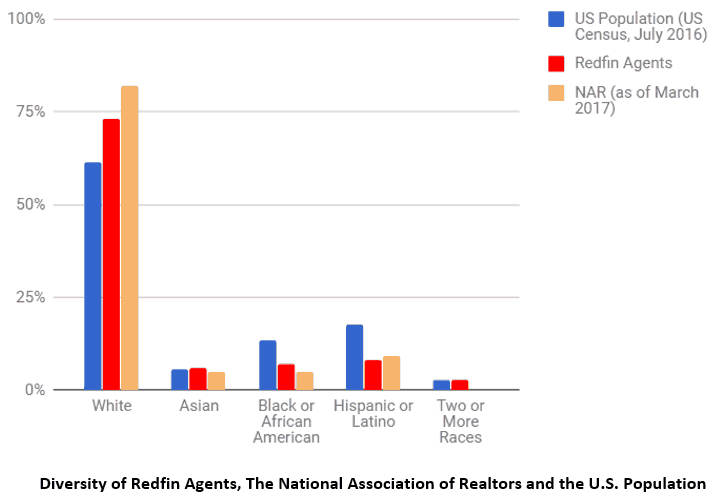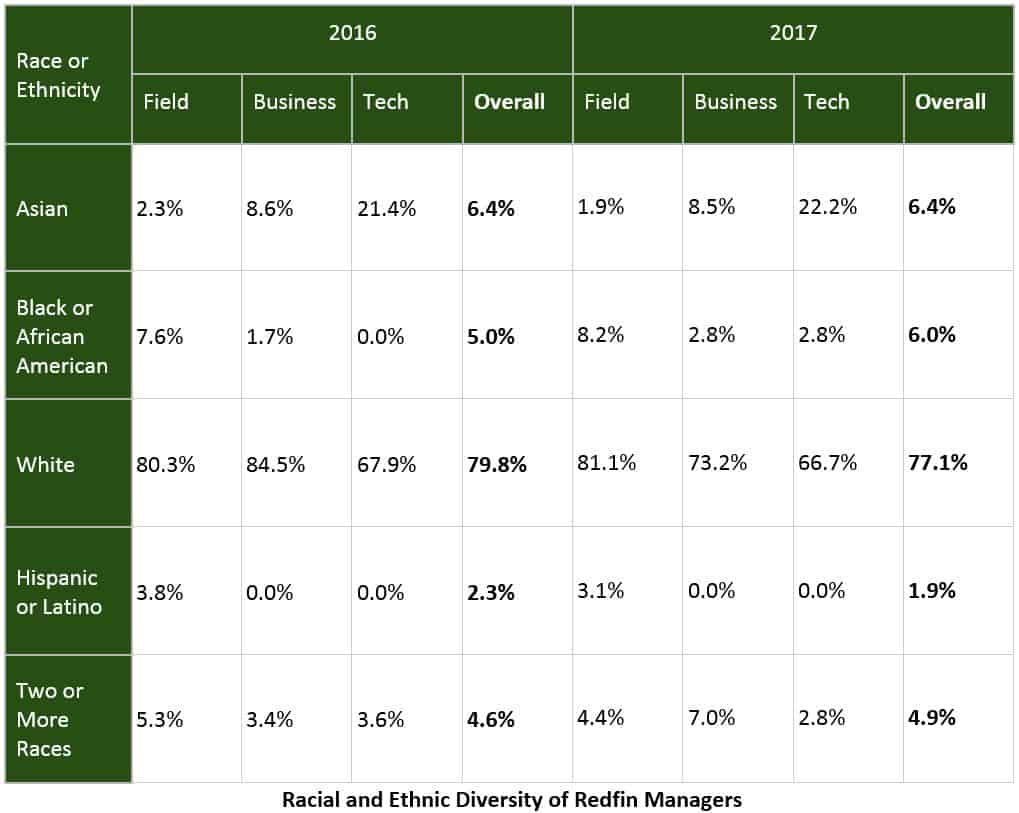Each year, we publish a report on gender, racial and ethnic diversity at Redfin. In the past, this report has also included a comparison of pay for men and women, but we’re now publishing the pay report separately in April. For brevity, this report doesn’t detail our support for other types of diversity, in age, political opinions, sexual orientation, military service, mental health or physical ability, but it’s important for us to attract talent of all types to Redfin.
Gender Diversity
First, let’s discuss gender diversity. Our technology team, which includes engineers, product managers and product designers, has continued to increase its representation of women, from 25% in 2015, to 30% in 2016, to 32% in 2017. This level of representation is still below half, but it compares well to Apple, which is at 23%, Facebook at 19% and Google at 20%.
Redfin’s other headquarters employees, collectively known as business operations employees, are 60% women; in 2016, 57% of business operations employees were women. Our field organization is also 60% women. In 2017 as in 2016, the company overall is 58% women.

More of these women are becoming managers: 46% of our managers are women, up from 44% in 2016. Over time, we expect to see the same proportion of women in management as in our overall workforce. Only in business operations, where 58% of managers are women, have we reached that goal.
In field operations, 48% of managers are women; in technology, 19% are, a decline from 30% in 2016. Our technology department lost four mid-level women managers since we measured this last year, but at the director level and above, our technology team is 50% women. Across the whole company, 46% of vice-presidents and other senior executives are now women.
Racial Diversity
Among employees who identify as black or Hispanic, Redfin’s racial and ethnic diversity increased modestly over the past year.

Though the proportion of Asians declined slightly overall from 2016 to 2017, we were glad to see a slight increase in field operations, where we’ve made a concerted recruiting effort in response to the high proportion of Asian customers we serve. We’ll discuss diversity in our field organization in more detail below, but first let’s discuss our technology team.
Racial and Ethnic Diversity on our Technology Team
The area where we still need to make the most progress is in attracting and developing more black and Hispanic software engineers, product managers and product designers. Folks in these roles have an unusual amount of power, determining what millions of online visitors see on our website and our mobile application. While recruiting and developing women for technical roles continues to be important, in 2017 we decided that racial and ethnic diversity would become a higher priority.
We’ve already broadened our technology recruiting efforts to reach more schools, training programs and professional organizations popular among people of color, from seven events in 2016 to 14 events in 2017. We’ve updated our job descriptions to broaden their appeal, and standardized our interviewing process in an effort to eliminate bias from our evaluation of job applicants.
We’ve documented promotion criteria for every engineering and product management role, and institutionalized quarterly career check-ins between managers and engineers to ensure as best we can that managers evaluate employees objectively and communicate consistently. Our next project is to review our rewards and recognition programs for evidence of bias. Even since completing our survey of employee diversity, we have seen more people of color join our technology team, and we expect to make more progress in 2018.
Racial and Ethnic Diversity in Field Operations
It’s also important for our field operations team to reflect the society we serve, as real estate agents have had an outsized influence on where Americans live, and which neighborhoods have become more racially integrated. Race-related housing problems are not ancient history; in a 2016 Redfin survey of 569 homebuyers of color, 48.8% reported feeling some concern that their offer wasn’t welcomed by the homeowner or the listing agent because of the buyers’ race or ethnicity.
To do our part to combat this problem, Redfin needs to keep hiring and developing people of color as real estate agents. From 2016 to 2017, the percentages of Asians, blacks and Hispanics in Redfin field operations all increased. Redfin’s real estate agents still don’t reflect the society we serve, but are often more diverse than the real estate industry.

As we’ve written before, one reason that 82% of the National Association of Realtors is white is that members of the ethnic majority are more likely to prosper in a role where success largely depends on your ability to recruit customers from your social network.
Redfin and other real estate websites may be changing that, because we use the Internet to introduce customers to agents. Rating Redfin agents on objective criteria, and publishing those ratings to our website has, we believe, increased the likelihood that one of our white customers will hire a black real estate agent.
Our decision to employ our agents, rather than solely hiring contractors, lets us recruit a broader range of talent. Investing in management and mentorship, and paying agents a salary, have made it more likely that folks from disadvantaged backgrounds will succeed in a profession where it is hard to learn the ropes quickly.
Racial and Ethnic Diversity Among Managers
Where we need to make the most progress is in developing people of color to management roles within the company. Compared to their levels of representation within the company overall, Asians, blacks, and Hispanics are underrepresented in management ranks, and progress from 2016 to 2017 has been mixed.

Of the thirteen people at the company with a vice-president title or higher, one is Asian and none are black or Hispanic. Retaining, developing and promoting more people of color into management roles is a high priority for me as Redfin’s CEO.
What Has Made A Difference, What’s Next
It is of course impossible to change the composition of Redfin overnight, especially as the company gets bigger and our hiring as a percentage of overall employees slows: in the early years, nearly half the company had been hired in the last twelve months, but now the vast majority of employees carry over from one year to the next.
Redfin nonetheless expects to make more progress on diversity in the next year, especially in developing people of color into management roles. This is mostly because pilot programs that have succeeded in different departments can now be rolled out company-wide:
- Documented promotion criteria for all roles with more than five employees
- Data-driven guidance on pay raises, to avoid biased or unintentional pay disparities
- A mentorship program for developing individual contributors into managers
To institutionalize these programs company-wide, we’re hiring a diversity and inclusion program manager, where the primary hiring criterion is a track record of developing programs that produce results.
We’re also rolling out a training program on inclusive management, which will be mandatory for all managers, and we’ve already increased pay for newly hired agents, to limit the financial pressures on agents who haven’t yet closed their first sales; this should help us recruit agents who need income in their first three months on the job.
There is lots more to talk about and lots more to do, but already we’re excited about how Redfin is changing, and how our leaders are changing, as all of this will let us serve customers better, build a more enduring company, and make more money!
Note: in last year’s diversity blog post, we reported on data pulled in July of 2016. This year we shifted the reporting timeframe to September, so the 2016 data is slightly different than what appeared in last year’s blog post.

 United States
United States Canada
Canada